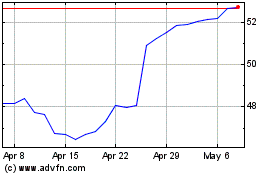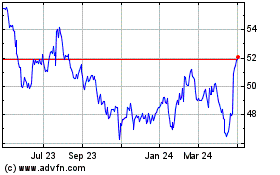Unilever Cuts Prices as Shampoo Rivalry Grows -- Update
October 17 2019 - 5:17AM
Dow Jones News
By Saabira Chaudhuri
LONDON -- Unilever PLC said it was forced to lower prices in the
U.S. to compete in the shampoo market with its rival Procter &
Gamble Co., as the owner of Dove and TRESemmé reported slower
third-quarter revenue growth compared with a year earlier.
"There's been a very vibrant and competitive battle in hair care
in North America," said chief financial officer Graeme
Pitkethly.
Unilever reported sales of EUR13.25 billion ($14.64 billion) for
the quarter, up from EUR12.53 billion a year earlier. Underlying
sales growth -- a closely watched figure that strips out currency
movements and deals -- was 2.9%. That is a deterioration from a
year ago when Unilever reported growth of 3.8%, and slightly below
analyst estimates for growth of 3%.
Mr. Pitkethly said Unilever is still on track to hit annual
growth targets and results were held back by a tough comparison
with a year ago, which included an exceptionally hot summer in
Europe that had boosted sales of its ice cream products.
Overall, results were driven by both volume and price, with
emerging markets growth driving sales.
In North America, however, Unilever raised prices by just 0.6%
compared with a 1.5% increase a year earlier. Mr. Pitkethly blamed
the rivalry with P&G for capping price growth, saying the U.S.
company was "very focused on the fundamentals" in hair care after
"a very lackluster period."
P&G said its hair brands have been expanding globally and
the company is focused on improving products, packaging,
communication and distribution.
Hair care has been a key battleground for consumer-goods
companies in developed markets like the U.S. and Western Europe for
years, and recently in China as well. Shampoo provides big profit
margins and the potential for innovation through adding minor
ingredients like vanilla extract or keratin proteins.
For Unilever, success in shampoo against its rival is
particularly important. Over the past decade, it has shifted its
focus toward personal-care products. Its new chief executive Alan
Jope was previously head of its personal-care arm.
Unilever bought Alberto Culver Co., maker of Alberto VO5 and
TRESemmé hair-care products, for $3.7 billion in 2011 and the TIGI
professional hair-care business for EUR411.5 million in 2009. Since
then, armed with this new range of shampoos, Unilever has gone on
the attack in the U.S. Its North American hair-care business now
comprises about 3% of global sales.
The company has doubled down on digital marketing over the past
few years, with a YouTube channel that offers styling tutorials. It
has also used social media channels to gather consumer insights
that can be translated into new products and launched bar shampoos
under its Love, Beauty and Planet brand, eliminating plastic
packaging.
P&G has been rolling out its Herbal Essences and Aussie hair
brands globally and the company has said it is focused on improving
products, packaging, communication and distribution. It has
launched a new rose water sulfate-free shampoo under its Pantene
brand and tweaked the formula and packaging for Head &
Shoulders.
Write to Saabira Chaudhuri at saabira.chaudhuri@wsj.com
(END) Dow Jones Newswires
October 17, 2019 05:02 ET (09:02 GMT)
Copyright (c) 2019 Dow Jones & Company, Inc.
Unilever (NYSE:UL)
Historical Stock Chart
From Mar 2024 to Apr 2024

Unilever (NYSE:UL)
Historical Stock Chart
From Apr 2023 to Apr 2024
